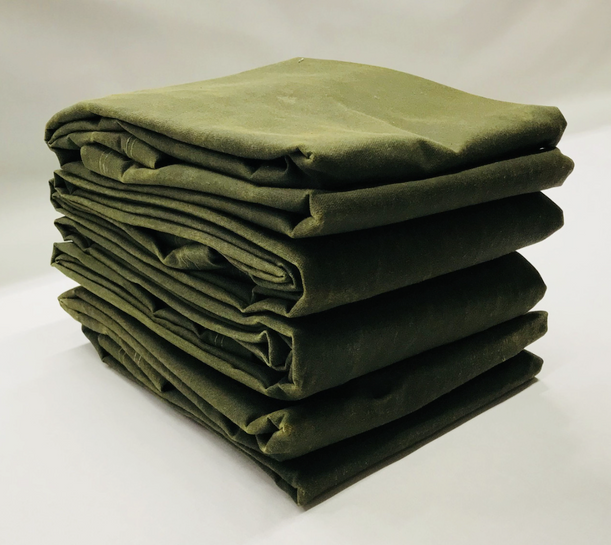Canvas tarps are indispensable in countless industries, from transportation to construction to agriculture. Debrovy’s supplies premium canvas tarps for professionals who need strength, breathability, and reliability.
Read on to learn why canvas tarps are the smart choice for heavy-duty needs.
What Is a Canvas Tarp?
Canvas tarps are heavy-duty protective covers of woven cotton or blend fabrics such as our waterproof polyester-blend canvas tarps featuring silicon-treated yarns.
Canvas tarps may be untreated (natural) or treated. Untreated canvas tends to be weaker with limited water resistance and fire resistance. Treated canvas tarps have waxes or chemical compounds that can repel moisture, resist mildew, withstand UV exposure, and even offer flame-retardant properties.
Advantages of Canvas Tarps
- Breathability: By eliminating condensation, canvas tarps can protect materials from mold and rust.
- Durability: This material is abrasion-resistant, capable of withstanding rough surfaces, which makes it ideal for repeated use in demanding environments
- Reduced Slippage: The textured surface is easier to grip, which is useful when trucking or covering machinery.
- Adaptable: Canvas tarps are flexible yet sturdy and can cover irregular shapes and wrapping around loads.
- Classic Appearance: Aesthetics matter, as transporting goods on the road in a branded semitruck could benefit from the timeless look of canvas, which also gives the impression of safely secured materials.
Common Uses for Canvas Tarps
Canvas tarps excel in applications where durability and breathability are critical.
Typical uses include:
- Construction and Contracting: Covering building materials, creating worksite enclosures, protecting concrete during curing
- Transportation: Securing loads on flatbed trucks, protecting heavy equipment during transit
- Agriculture: Covering hay, seed, or feed to protect from rain while allowing airflow; making field shelters for livestock
- Industrial Applications: Drop cloths for welding, covering furniture, painting, or sandblasting; covers for machinery or storage yards
- Outdoor and Recreational: Tent groundsheets, awnings, and shelters; camping tarps
- Emergency Response: Rapid-deploy cover for disaster relief, weatherproofing damaged structures
- Marine and Boating: Water-resistant boat covers that are durable enough to handle high winds
Choosing the Right Canvas Tarp: What to Look for
- Weight and Thickness: Heavier tarps may be bulkier, which can make handling less convenient, yet the tradeoff is that heavier tarps offer greater durability.
- Treatment: Some canvas tarps are made for different purposes. Treatment can influence water resistance, flame retardancy, suitability for outdoor use, and the like.
- Size: Measure the area or load to cover, while allowing for extra material to secure edges and accommodate irregular shapes.
- Grommet Spacing: Close grommets allow for tight and secure attachment to reduce flapping in windy conditions. The canvas tarps at Debrovy's feature brass tie-down grommets spaced approximately 24" apart.
- Color: Canvas tarps come in many colors, which can be useful for branding opportunities. Common options include white, blue, olive, gray, black, and tan. Darker colors usually show less dirt and offer superior UV resistance. Fair warning—colors may bleed.
Care and Maintenance of Canvas Tarps: Tips for Extending Use
- Dry Before Storage: Always allow tarps to completely dry before folding and storing. This can help prevent mold and mildew.
- Clean Gently: Spot-clean with mild soap and water. Be sure to avoid harsh detergents or solvents that could degrade the fabric or treatments.
- Store in a Cool Dry Place: Keeping tarps off damp floors and away from direct sunlight when not in use can guard against any undue damage that could shorten the longevity of the tarps.
- Inspect Regularly: Check for holes, frayed edges, or damaged grommets. Small tears can readily be repaired with canvas patches or sewing kits. Keep an eye on the tarps especially after recently purchasing, as this could help you spot any defects that could warrant a return or replacement.
- Avoid Prolonged Contact with Chemicals: Exposure to fuels, oils, or corrosive chemicals can deteriorate the canvas and compromise water resistance. If you are in the waste-management industry, consider going with landfill covers specially made for transporting covering flamable or hazardous materials.
Why Choose Debrovy’s Canvas Tarps?
When you need to source canvas tarps, one of the things you learn is that not all canvas tarps are created equal. Below are some reasons why professionals across industries trust Debrovy’s:
- Premium Quality Materials: Our tarps are made with superior weaving density to ensure exceptional tear strength and abrasion resistance. We also have a range of canvas tarps made of different materials, from treated blends to all-natural untreated canvas tarps.
- Custom Options: We can fabricate canvas tarps across a variety of sizes, shapes, and treatment requirements.
- Wide Selection: Choose from a variety of weights, treatments, and colors to match your application needs.
- Competitive Pricing: We provide durable canvas tarps at fair prices to help our customers maximize value without having to compromise on quality.
- Expert Support: Our experienced team understands the unique requirements of contractors, farmers, and industrial operators. We can guide you in selecting the perfect tarp for your needs.
Looking for a tarp for your specific use case? Reach out to Debrovy's to learn more about our wide selection of tarpaulins!

